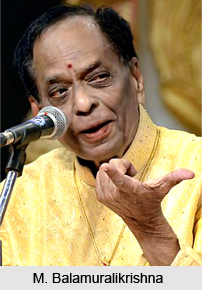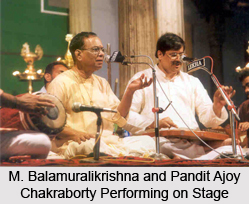 M Balamuralikrishna, also known as Mangalampalli Balamuralikrishna, is a Carnatic music singer, instrumentalist as well as a playback singer. Balamuralikrishna is also a celebrated poet, composer and appreciated by all Indian classical musicians for his expertise in Carnatic music. This legendary Carnatic music vocalist has also composed a number of songs. For his awe-inspiring creations, Mangalampalli Balamuralikrishna has received critical acclamation throughout his performing career. The Government of India has also bestowed him with the Padma Vibhushan.
M Balamuralikrishna, also known as Mangalampalli Balamuralikrishna, is a Carnatic music singer, instrumentalist as well as a playback singer. Balamuralikrishna is also a celebrated poet, composer and appreciated by all Indian classical musicians for his expertise in Carnatic music. This legendary Carnatic music vocalist has also composed a number of songs. For his awe-inspiring creations, Mangalampalli Balamuralikrishna has received critical acclamation throughout his performing career. The Government of India has also bestowed him with the Padma Vibhushan.
Early Life of Mangalampalli Balamuralikrishna
Mangalampalli Balamuralikrishna was born on 6th July, in the year 1930, in Sankaraguptam, East Godavari district, Andhra Pradesh. He was born to Mangalampalli Pattabhiramayya (father), who was a master in playing flute, violin and the veena and Suryakanthamma (mother) who was an excellent Veena player. Mangalampalli Balamuralikrishna was only 15 days old when his mother passed away. At the tender age of 5 years, he started receiving training in music. At the time of his birth, he was named as Murali Krishna. An identified Harikatha performer, Musunuri Suryanarayana Murty Bhagavatar, as blessings, gave a prefix Bala to the young Muralikrishna. Since then he is known as Mangalampalli Balamuralikrishna.
Career of Mangalampalli Balamuralikrishna
Balamuralikrishna first performed in a concert at Thyagaraja Aradhana, Vijayawada, at the age of 8. He was identified as a top graded artist of All India Radio. Moreover, he was selected for seven different performance areas. He has also bagged the honour of being the only National Award winner musician who has won this award for his execution in classical music, music direction and film playback singing. In 1952, the Janaka Raga Manjari was released and the 9 volume Raagaanga Ravali were recorded by the Sangeeta Recording Company. Due to the increased number of concerts, Balamuralikrishna could not continue his studies.
Mangalampalli Balamuralikrishna in a short span of time proved himself to be a versatile artist who can play the Kanjira, Mridangam, Viola and Violin equally excellent. By the age of 16 years, he exhibited his mastery over all these 72 Melakarta Ragas and to his credit; he has composed Kritis in all of them.
 Balamuralikrishna has composed near about 400 Carnatic musical compositions. He has attempted to incorporate new ragas (Ganapathi, Mahati, Sumukham, Trisakthi, Sarvashri, Omkari, Janasamodini, Manorama, Rohini, Vallabhi, Lavangi, Pratimadhyamavathi, Sushama etc) with only 3 or 4 notes, and a new Tala system and these have been reckoned as his innovation. Some famous compositions done by him are Sri Sakala Ganadhipa Palayamam, Mahadevasutham, Gam Gam Ganapathim.
Balamuralikrishna has composed near about 400 Carnatic musical compositions. He has attempted to incorporate new ragas (Ganapathi, Mahati, Sumukham, Trisakthi, Sarvashri, Omkari, Janasamodini, Manorama, Rohini, Vallabhi, Lavangi, Pratimadhyamavathi, Sushama etc) with only 3 or 4 notes, and a new Tala system and these have been reckoned as his innovation. Some famous compositions done by him are Sri Sakala Ganadhipa Palayamam, Mahadevasutham, Gam Gam Ganapathim.
Mangalampalli Balamuralikrishna has performed in all most all the countries including USA, Canada, UK, Italy, France, Russia, Sri Lanka, Malaysia, Singapore, Middle East etc. Throughout the world, he has given more than 26000 performances. He has executed Jugalbandhis with maestros like Bhimsen Joshi, Pandit Hariprasad Chaurasia and Kishori Amonkar
Other Activities of Mangalampalli Balamuralikrishna
Mangalampalli Balamuralikrishna also developed interest in music therapy. In Switzerland, Mangalampalli Balamuralikrishna founded Academy of Performing Arts and Research and simultaneously worked on music therapy. The MBK Trust has also been established by him. The aim of this trust is to develop art and culture and carrying out extensive research in music therapy.
Achievements of Mangalampalli Balamuralikrishna
As recognition to expertise of Mangalampalli Balamuralikrishna, Government of India has conferred the highest civilian award, the Padma Vibhushan. He was also honoured with Padma Bhushan for his contributions. Other accolades to name are the Chevalier des Arts et des Lettres by the French government, the Pro-Chancellorship of Telugu University and numerous top musical honours including Sangeetha Kalanidhi (1978) of the Madras Music Academy. In the year 1980, he has been conferred the Raja-Lakshmi Award by Sri Raja-Lakshmi Foundation, Chennai. Manava Seva Kendra has conferred him the Sangeetha Saraswathi award. Mangalampalli Balamuralikrishna has also bagged the honour of being the Honorary First citizen of Vijayawada in Andhra Pradesh.
Some other accolades include, the Gana Sudhakara, Gayaka Sikhamani, Sur Singar, Geeta Kala Bharati, Sangeet Natak Akademi Award, and Padma Shri. In the year 1992, he was chosen as the Wisdom Man of the Year in 1992. By the year 2006, Balamuralikrishna was conferred seven doctorates (honourary Ph.D, D.Sc and D.Litt) by various universities such as Andhra University, Jawaharlal Nehru Technological University, Sri Venkateswara University and the University of Hyderabad. In the year 1997, the Chief Minister of Andhra Pradesh honoured him with the Atma Gauravam Award. A road in the city has also been consecrated on his name. For the cause of national integration, the Governor of Maharashtra honoured him for services rendered. He has also proved his mastery over the languages Kannada, Sanskrit and Tamil, other than Telugu.




















